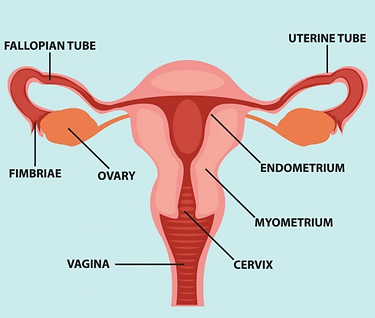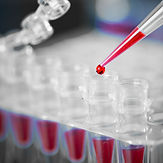FEMALE REPRODUCTIVE HEALTH

40% of infertility problems are female related.
-
Approximately 1 in 6 couples experience fertility problems.
-
40% of infertility problems are male related.
-
40% of infertility problems are female related.
-
20% of infertility problems are a combination of both male and female.
-
Approximately 60% of all couples with fertility problems have male factor issues.
The female reproductive system is designed to carry out several functions. It produces the female egg cells necessary for reproduction, called the ova or oocytes. The system is designed to transport the ova to the site of fertilization. Conception, the fertilization of an egg by a sperm, normally occurs in the fallopian tubes. The next step for the fertilized egg is to implant into the walls of the uterus, beginning the initial stages of pregnancy. If fertilization and/or implantation does not take place, the system is designed to menstruate (the monthly shedding of the uterine lining). In addition, the female reproductive system produces female sex hormones that maintain the reproductive cycle.
Female Infertility Testing
Most hormones work through interactions with the brain and have either a direct or indirect influence on each other. The main glands involved in hormone secretion and activity include: the hypothalamus (gland at the base of the brain), pituitary (gland in the middle of the brain), gonads (ovaries and testes), adrenals (glands located above the kidneys), and thyroid gland (located beneath the voicebox), as well as the pancreas and liver . Testing for individual hormone levels that are produced by various hormone-producing glands can identify irregularities that can produce negative effects on menstrual and reproductive function.
Identifies chromosomal abnormalities and DNA mutations that correlate with various infertility related disorders. Typically genetic abnormalities are the cause of spontaneous abortions. In other cases an abnormal tests may indicate the possibility a baby will have a specific medical condition or disease when born.
A woman’s ability to successfully maintain a pregnancy is significantly influenced by a complex alteration of her immune system designed to prepare her body to host a developing embryo. There are other immunological alterations that occur to protect the developing embryo, which is essentially a foreign organism developing within a woman’s body. In some cases these mechanisms do not work as intended and, depending upon the circumstances, might cause immune system disorders that result in recurrent miscarriages, infertility, or failure to conceive following IVF.
During the diagnostic work-up various blood tests have to be conducted prior to assisted reproduction attempts in order to verify the presence or absence of various infectious diseases. Having one of these infections could be a contributing factor to a couple’s infertility issues thereby affecting the outcome of an assisted reproduction attempt. Another important reason for this testing is the fact that many of these infections can be passed along to the baby, potentially jeopardizing their health and the pregnancy.
A term used to determine the capacity of the ovary to provide eggs. Essentially egg quantity is what is being measured and gives an estimation of the number of eggs a woman has remaining for future use. Each ovary has a predetermined number of follicles (fluid-filled sacs that develop into eggs) that are potentially available during the course of a woman’s reproductive life. The actual number varies from individual to individual. During a normal monthly menstrual cycle one egg is released by either one of the two ovaries while approximately one thousand additional follicles are lost due to atresia (a process in which immature eggs or follicles degenerate and are resorbed). Tests of ovarian reserve can help estimate a woman’s remaining egg supply.
A condition found in women who typically don’t ovulate, characterized by excessive production of androgens (male sex hormones) and the presence of cysts in the ovaries. Follicles go through the normal maturation process but fail to become eggs due to the hormonal imbalance. PCOS can range from mild to serious, and so can the symptoms. Some of the symptoms might include: excessive weight gain, acne, diabetes and excessive hair growth.
A loss of ovarian function by a woman under the age of 40. As a result a woman does not ovulate each month. Some women will have other menopause-like symptoms that may include: hot flashes and night sweats, irritability, poor concentration, decreased interest in sex or pain during sex, drying of the vagina and infertility. Other complications, some of which can be tested for, include: low thyroid function, autoimmune disorder, genetic disorder, osteoporosis or heart disease.
Defined as two or three consecutive miscarriages in the first or early second trimester. Many factors can be involved in recurrent miscarriages including: genetic/chromosomal, age, hormones, metabolic abnormalities, anatomic abnormalities, immunological problems, clotting disorders and in many cases it can remain unexplained.
Ovulation induction involves the use of fertility drugs that mimic the body’s natural hormones in an attempt to stimulate the ovaries to produce multiple eggs during an IVF cycle. Blood tests for hormone monitoring can be used to determine a patient’s normal hormonal levels at the beginning of a cycle and to assist in determining medication type, dosage and start date. Throughout the stimulation cycle hormone levels are used to monitor a patient’s response to the fertility drugs. Results are compared to previous measurements to determine whether the medication protocol is optimal or needs to be altered.
Refers to inherited or acquired disorders that can result in an increased chance for abnormal blood clotting. During pregnancy this can cause microscopic clots to form in the placenta depriving the fetus of adequate blood flow. Several tests have been developed to assist in assessing the clotting capacity of a patient. Candidates for Thrombophilia testing typically include: recurrent pregnancy loss, infertility, implantation failures, In vitro fertilization and embryo transfer (IVF-ET) failures, thromboembolic disease at a young age with no associated trauma, positive family history or whose thrombosis involves an unusual site.
The primary use of AMH testing is to assess a woman’s ovarian reserve status or, in more basic terms, it is an approximation of the supply of eggs a woman has remaining.












